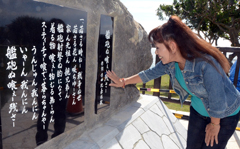Song Leftovers of the Warship inscribed on stone

On June 15, at Sobe in Yomitan, Tsuyako Shimabukuro, daughter of the writer of Kanpo nu Kwe-nukusaa, traced her fingers across her father's name on the stone monument.
June 22, 2013 Ryukyu Shimpo
The monument featuring an Okinawa folk song Kanpo nu Kwe-nukusaa (Leftovers of the Warship) has been completed in Sobe in Yomitan. This well-known Okinawan folk song, written by Koubin Higa describes the feelings of people who survived the war.
The songwriter’s four daughters, who set up the Okinawan folk music group Deigo Musume, took part in the unveiling ceremony held on June 23.
Tsuyako Shimabukuro, Higa’s oldest daughter, said, “My father did not die in the war so his name is not on the Cornerstone of Peace memorial in Itoman. This is our father’s peace memorial.” She traced her fingers across her father’s name inscribed on the stone.
The song entitled Kanpo nu Kwe-nukusaa refers to the surviving Okinawan people being the scraps left over after the naval bombardment had eaten up their parents, families, houses and almost everything else on the islands.
In its light and easy rhythm, which includes some light-hearted lyrics, it tells of the sadness in the hearts of the people who lost family during the war and their wishes for peace. The song has aroused feelings of sympathy from many people. Higa lost six family members during the Battle of the Okinawa. He and his wife were killed in the car accident in 1973 when an American soldier driving under the influence of alcohol smashed into their car at Oyama in Ginowan. This year marks the 40th anniversary of their death. If he were still alive now, Higa would have celebrated the Kajimaya ceremony to mark the age of 97.
Chizuko Fukuhara, the songwriter’s third daughter, still remembers her father singing the song in the middle of the night as he played the sanshin. She said tearfully, “I want to thank everyone who helped to set up this monument. My father was a humble and self-effacing man, but I think that he would be happy.”
Geno Ikehara, the leader of the group that erected the monument, said, “Each one of us has a similar story to that of Kanpo nu Kwe-nukusaa. I want people to pass down this song to their children and grandchildren.”
(English translation by T&CT, Mark Ealey)
Previous Article:Town needs to work to preserve Tanabaru Field Hospital Shelter
Next Article:Mural of coral in Okinawa
[Similar Articles]
- Memorial Service for 10.10 Air Raid held
- Monument of Nuchi du Takara completed at Peace Memorial Park
- 60 people gather to make a pledge for peace as Taiwan monument erected
- Nine years since U.S. helicopter crash onto Okinawa International University: Protesters stage a “die-in rally” in front of Marine base
- More than 400 people attend memorial service held for victims of Tsushima-Maru tragedy
 Webcam(Kokusai Street)
Webcam(Kokusai Street)


